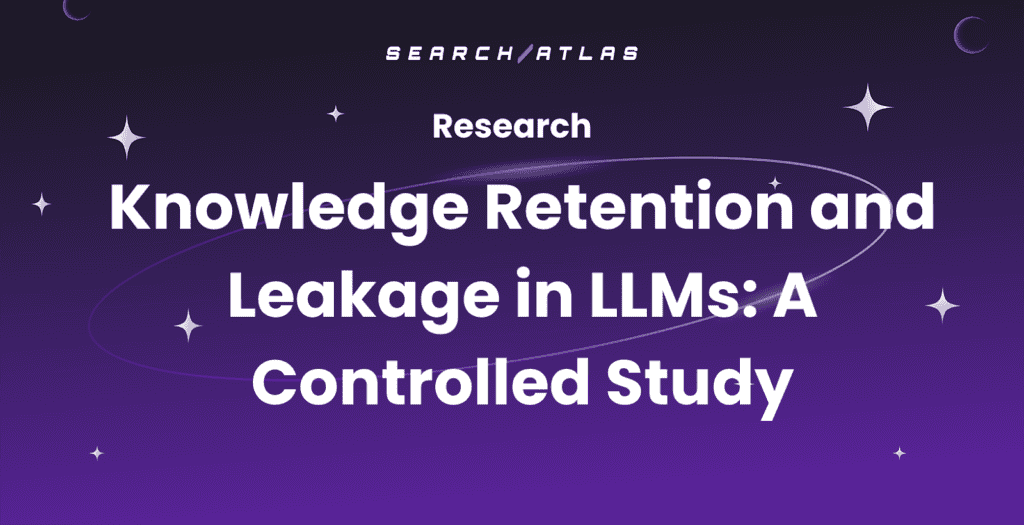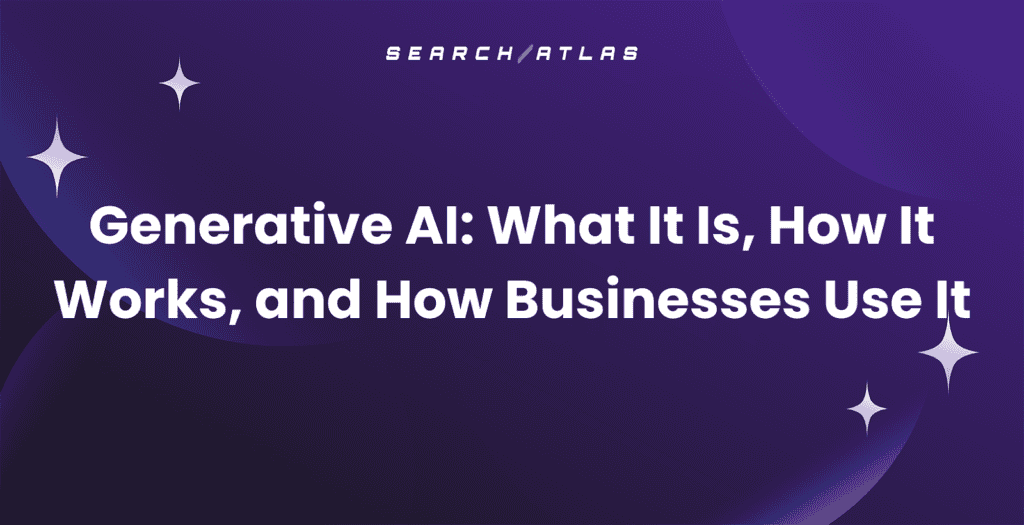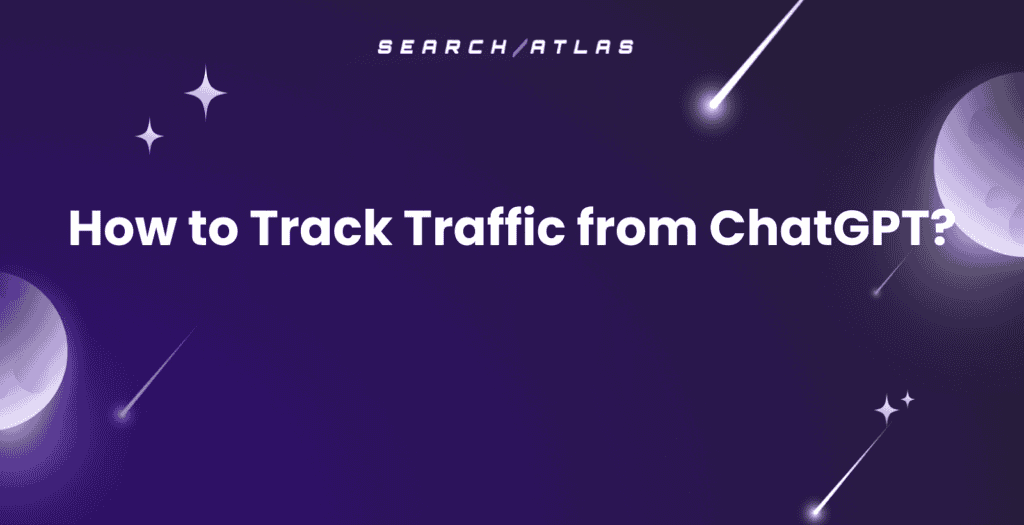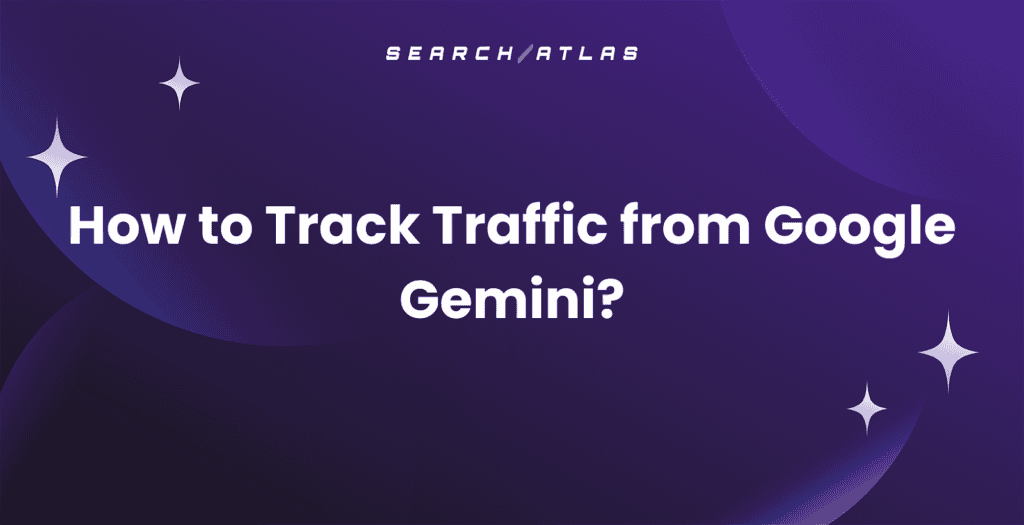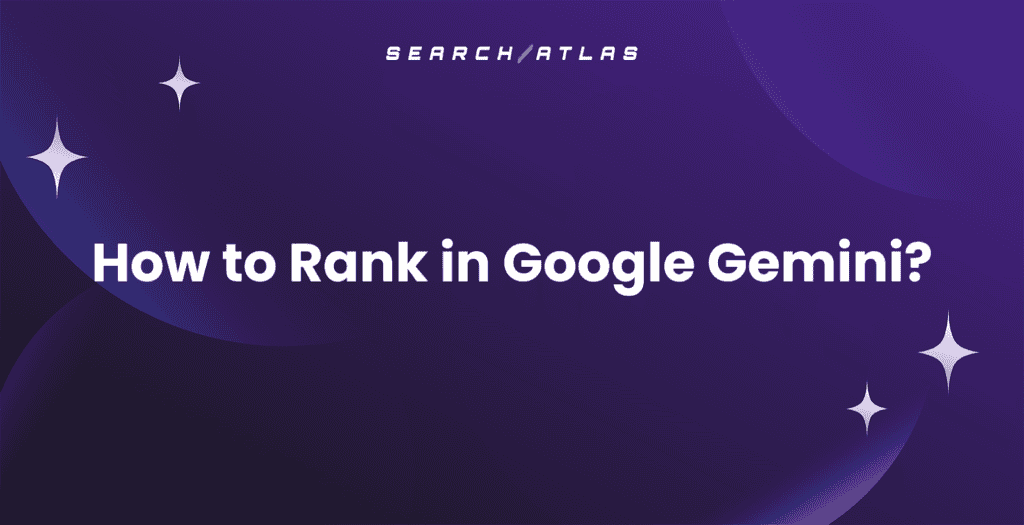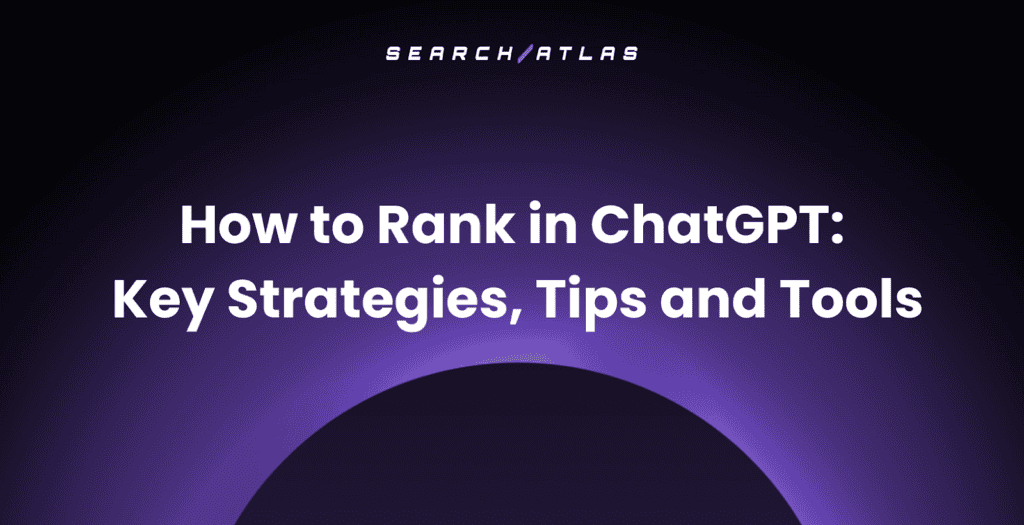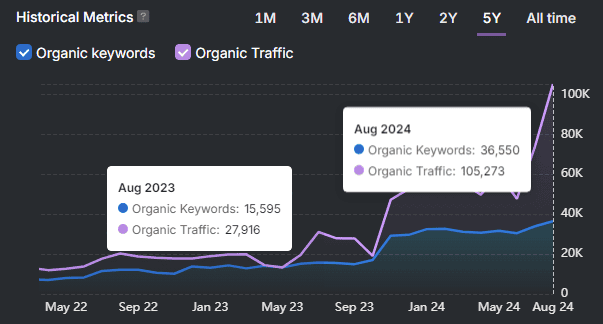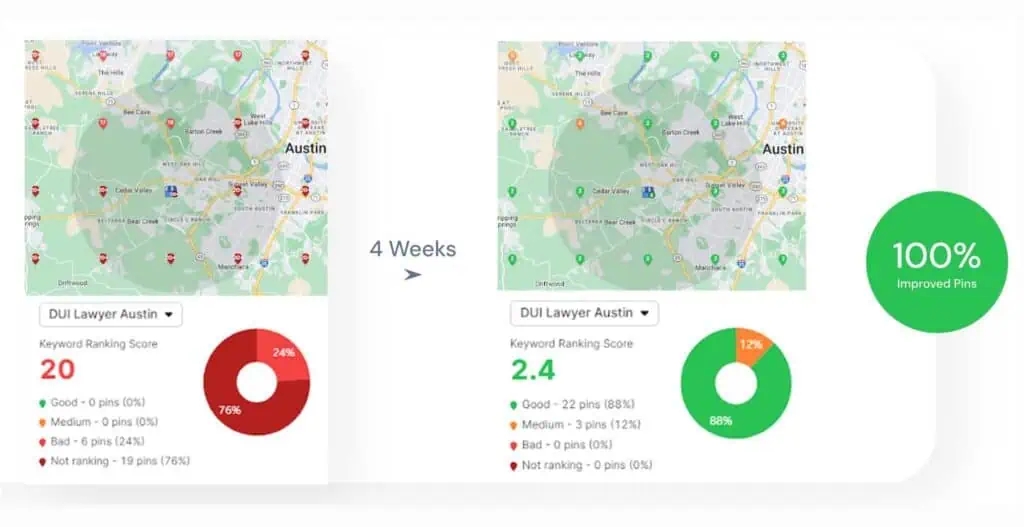B2B SEO refers to search engine optimization strategies designed to attract and convert business clients. Business-to-business SEO focuses on driving organic traffic from high-intent buyers, decision-makers, and procurement teams across industries. The key attribute of B2B SEO is its alignment with longer sales funnels, industry-specific content, and purchasing processes that involve multiple stakeholders.
B2B SEO is important because it increases visibility, builds trust, and generates qualified leads for companies targeting other businesses. High SERP (Search Engine Result Page) placement helps brands appear as thought leaders, answer buyer questions early, and influence purchase decisions before a sales conversation even begins.
To implement an effective B2B SEO strategy, prioritize three foundational actions. Map keywords to your sales funnel to ensure each page targets a specific stage in the buyer journey. Develop content that speaks directly to business goals and decision criteria, including metrics, case studies, and use cases. Optimize your website architecture and technical SEO for crawlability, fast load times, and strong internal linking. These steps form the baseline for a scalable and measurable SEO strategy in business markets.
What is B2B SEO?
B2B SEO is the practice of optimizing a website and its content to rank in search results specifically for business-to-business queries. B2B search engine optimization targets professionals, teams, or organizations that are searching for solutions, products, or services that support their business operations. SEO for B2B includes aligning with informational, transactional, and navigational keyword intent across longer sales cycles.
The goal of SEO for B2B is to generate qualified organic traffic that converts into enterprise leads, demo requests, or high-value sales.
B2B SEO focuses on keywords, content, and technical performance tailored to how businesses research and evaluate vendors. Unlike B2C, where the buyer journey is often short and emotional, B2B buyers are rational, value-driven, and consult multiple sources over 3 to 6 months. According to a study by Demand Gen Report, 62% of B2B buyers engage with 3 to 7 content pieces before speaking to a salesperson. B2B search engine optimization must provide depth, context, and trust signals at every stage of the funnel.
What is the Importance of SEO for B2B?
The importance of SEO for B2B lies in attracting high-intent traffic, building credibility, and driving long-term lead generation from organic search. Business buyers rely heavily on search engines during the research and solution evaluation process. A strong B2B SEO strategy ensures that your content and web pages appear at the top of search results when decision-makers are actively looking for related services, tools, or insights.
The role of SEO in B2B is to position companies as authoritative sources early in the buyer journey, shorten sales cycles, and reduce acquisition costs. Ranking for decision-stage keywords like “B2B cybersecurity vendors” or “best CRM for enterprises” enables companies to capture leads before they contact competitors.
SEO for B2B companies supports scalable growth by generating traffic that does not rely on paid ads or outbound sales. Organic visibility compounds over time, which increases monthly traffic and reduces dependency on PPC budgets. SEO content feeds other channels, such as email marketing, sales enablement, and retargeting, by supplying high-value landing pages, blog articles, and solution-specific resources.
In B2B, SEO directly impacts visibility, lead quality, and cost efficiency.
How to Rank for B2B with an Effective SEO Strategy?
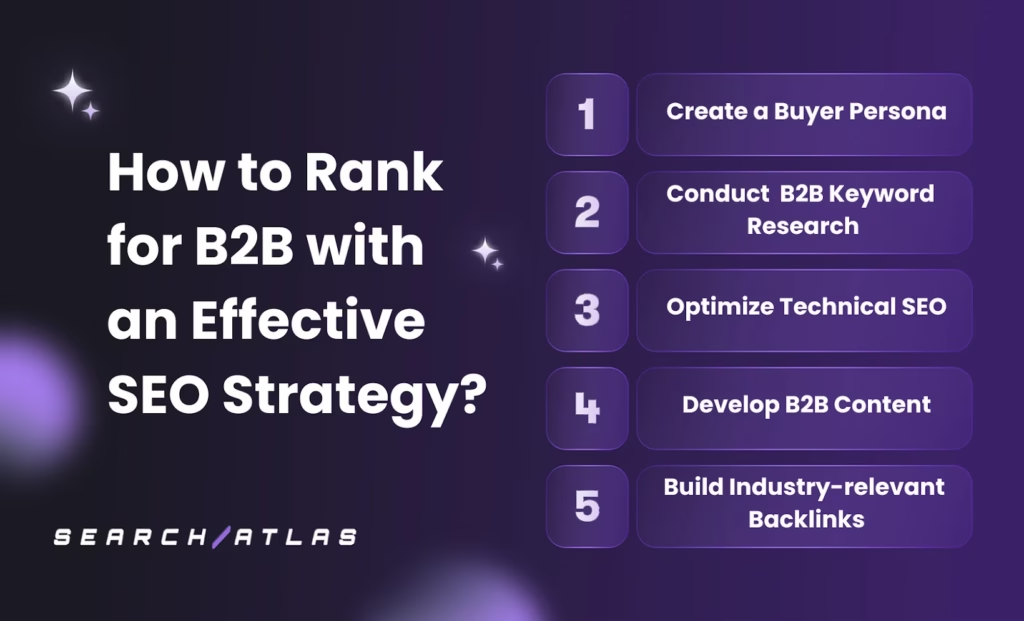
Ranking for B2B requires an SEO strategy that combines keyword research, technical optimization, and content creation tailored to business buyer behavior. B2B SEO best practices focus on understanding industry terminology, addressing complex buyer journeys, and demonstrating measurable business value. B2B SEO solutions integrate multiple optimization techniques specifically designed for longer sales cycles and higher transaction values.
The 5 best practices for B2B SEO are listed below.
1. Create a Buyer Persona
A buyer persona is a detailed profile of a customer based on role, goals, challenges, and search behavior. A B2B buyer persona represents the person responsible for researching, evaluating, and recommending solutions in the buyer organization. Creating this persona gives your SEO strategy a clear target. It helps you choose the right keywords, structure your content, and design calls to action that drive conversions.
The benefits of building a B2B buyer persona for SEO are listed below.
- Matches keyword research to real-world decision-makers.
- Guides content creation based on actual business needs.
- Improves content performance across funnel stages.
To create a B2B buyer persona for SEO, firstly interview 5 to 10 high-fit customers. Ask about their job role, goals, and top questions during the buying process.
Secondly, talk to your sales or customer support team. Ask what objections they hear and what content the leads request.
Thirdly, use the Search Atlas Keyword Research Tool to identify the exact search terms your target buyers use.
For example, your persona is a VP of Operations in a manufacturing company. She reads checklists, comparison pages, and vendor ratings before choosing a tool. Her searches include “process automation platform for manufacturers” and “OEE improvement dashboard.”
You connect SEO with business needs when every page and keyword is created with a clear buyer in mind.
2. Conduct Comprehensive B2B Keyword Research
Comprehensive B2B keyword research identifies and analyzes search terms business buyers use when seeking solutions. B2B keyword research targets industry-specific terminology, technical specifications, and problem-solution combinations reflecting professional search behavior. The B2B keyword research process uncovers high-value keywords with commercial intent that drive qualified traffic.
The Search Atlas Keyword Research Tool provides access to over 5.2 billion keywords, including exact-match terms, long-tail variations, and question-based queries that B2B buyers use. The Search Atlas Keyword Research Tool calculates Keyword Difficulty based on backlink profiles, on-page content quality, and PageRank values from top-ranking domains. Advanced filters for language, location, keyword type, and intent help B2B companies target professional search behavior.
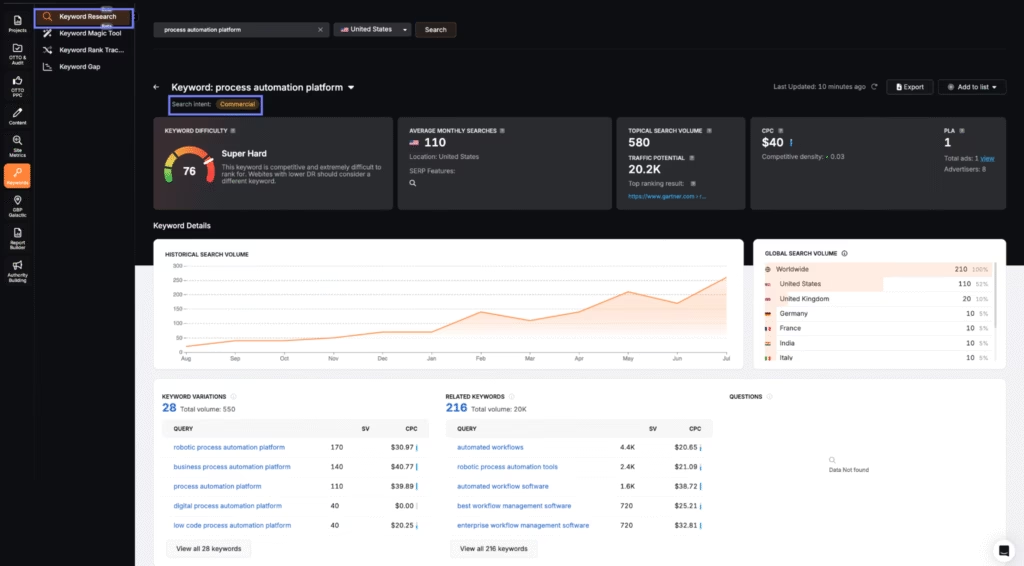
Once you enter a B2B service keyword, the tool returns extensive data, including search volume, CPC (cost-per-click), competition level, search intent classification, and keyword difficulty scores.
You get the SERP overview to easily spot your top competitors, as well as a list of the most successful advertisers and their top ads for the query.
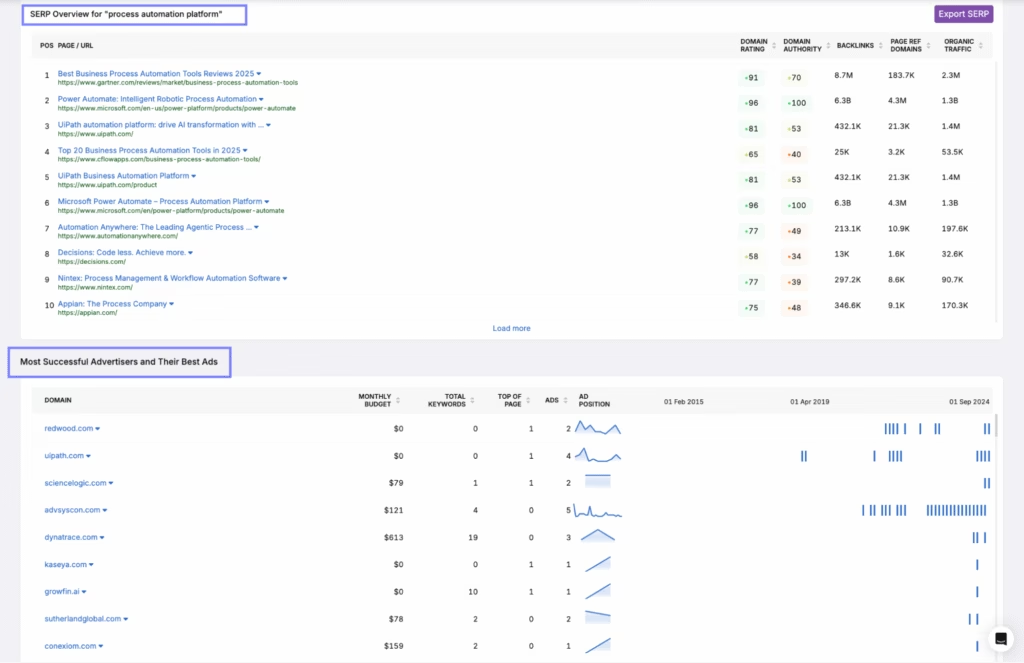
Benefits of B2B keyword research include discovering niche industry terminology with commercial intent, identifying keyword clusters for content development, uncovering competitor keyword opportunities, and analyzing seasonal trends in B2B search behavior.
The best practices for comprehensive B2B keyword research are listed below.
- Target keywords with 3 to 7 words reflecting specific business needs.
- Focus on solution-oriented terms rather than generic industry labels.
- Research competitor keywords using industry-specific modifiers.
- Prioritize keywords indicating buying stage progression.
Create three keyword priority categories (high, medium and low) based on business impact and competitive landscape. High-priority keywords demonstrate clear commercial intent with manageable competition levels. Medium-priority keywords support long-term authority building through educational content. Low-priority keywords capture niche traffic and support comprehensive topical coverage.
3. Optimize Technical SEO for Enterprise Websites
Technical SEO is the process of optimizing website structure, code, and crawlability to help search engines access and rank B2B content. An ineffective structure prevents top-ranking positions even if the content is strong. Technical SEO problems include broken tags, crawl blocks, or JavaScript errors.
Enterprise B2B websites require advanced technical optimization due to complex architectures, multiple subdomains, and large content volumes.
The 4 must-haves in technical SEO for B2B are below.
- Implementing SSL certificates for security credibility.
- Optimizing page load speeds to under 3 seconds.
- Creating XML sitemaps for complex site structures.
- Using schema markup for business information and products.
The Search Atlas Site Auditor scans all pages under a domain and identifies issues that block search engine access, limit visibility, or reduce performance. The Search Atlas Site Auditor categorizes issues by severity and scope, with detailed insights into crawl errors, non-indexable pages, redirect loops, and duplicate metadata. Each flagged issue includes recommended fixes and explanations of ranking impact.
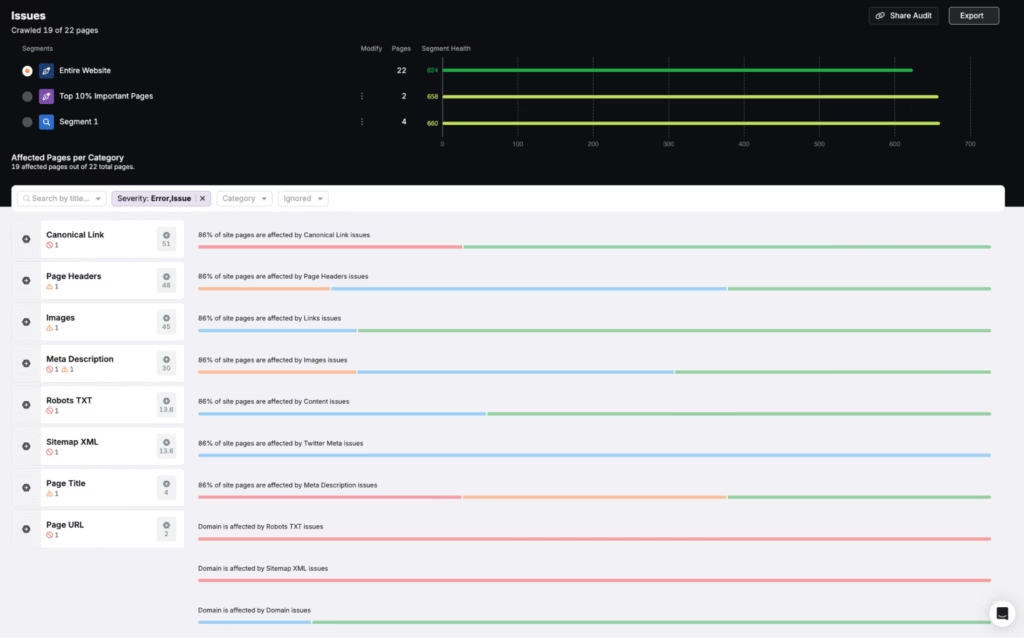
5. Build Industry-relevant Backlinks
B2B link building focuses on earning backlinks from industry publications, trade associations, and authoritative business sources. Quality backlinks from relevant industry sources improve domain authority while establishing credibility with target audiences. B2B link building emphasizes relationship development, thought leadership, and value creation rather than transactional link acquisition.
Industry-relevant B2B link opportunities include trade publications, professional associations, industry directories, and business news outlets.
- Trade publications value expert insights and industry analysis.
- Professional associations promote member content and thought leadership.
- Industry directories provide targeted visibility to business buyers.
- Business news outlets cover industry trends and company developments.
Develop linkable assets that provide genuine value to industry professionals and publications. Linkable assets include original research studies, industry surveys, comprehensive guides, and data-driven analysis.
These B2B resources attract natural links while establishing expertise and thought leadership within target markets.
The Search Atlas Backlink Research Tool identifies link building opportunities through competitor analysis and industry research. The Search Atlas Backlink Research Tool analyzes competitor backlink profiles, identifies referring domains, and uncovers potential link targets for outreach campaigns.
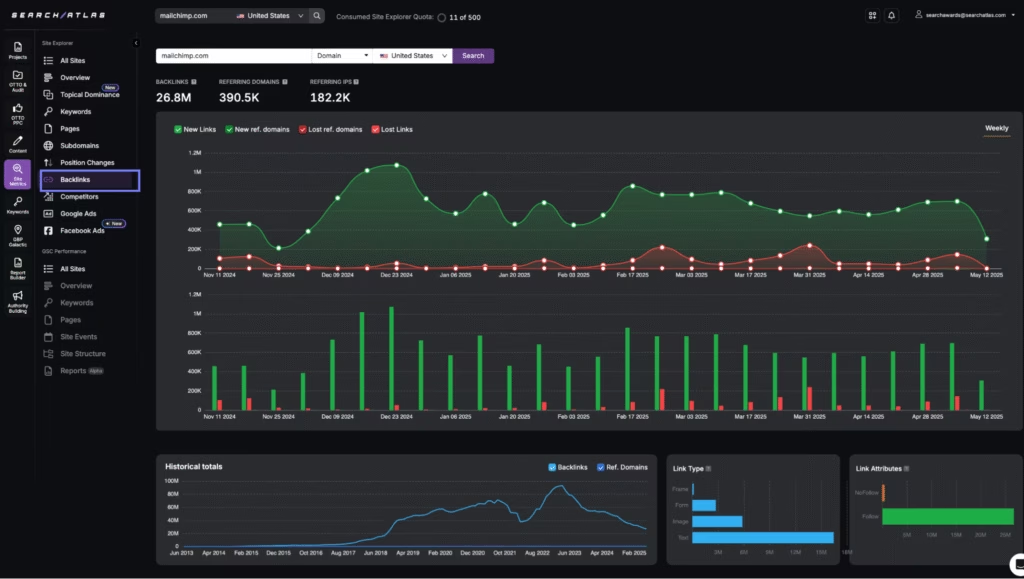
Check out competitor backlinks, anchors, referring domains, referring IPs, indexed pages, and outbound domains to prioritize high-value opportunities.
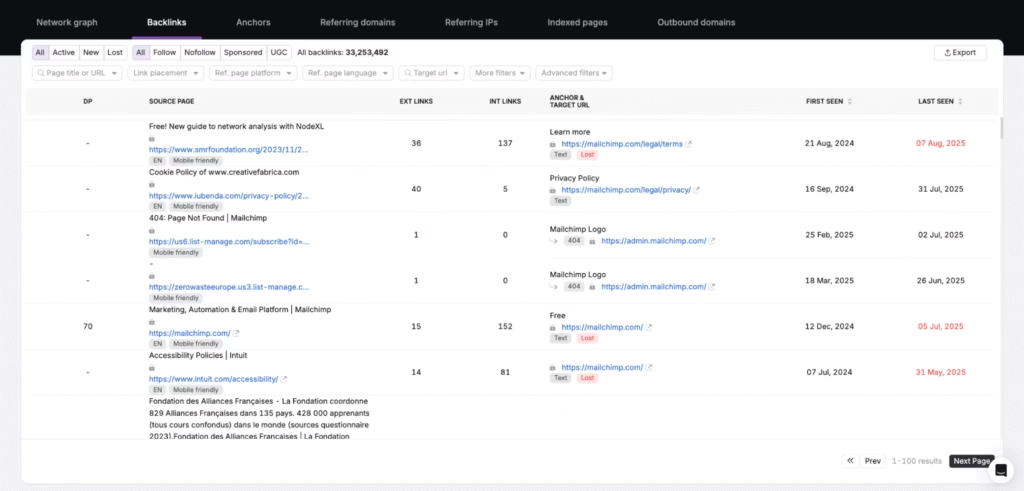
Then, launch targeted outreach campaigns using the Search Atlas Link Building Outreach and Digital PR Tool. The Search Atlas Link Building Outreach and Digital PR Tool centralizes prospect discovery, pitch creation, and lead management into one dashboard. For example, a SaaS agency targeting DevOps keywords filters link partners by DR 50+ and traffic volume, imports contact information with one click, and schedules follow-up emails using built-in templates.
How Does B2B SEO Content Strategy Support the Sales Funnel?
B2B SEO content strategy supports the sales funnel by aligning search-optimized content with the buyer’s journey from awareness to decision. Each stage of the funnel (top, middle, and bottom) requires specific content types that solve business problems, answer professional queries, and build trust with decision-makers.
At the top of the funnel (TOFU), B2B SEO marketing uses blog posts, guides, and educational articles to attract early-stage visitors. These visitors search for broad questions related to pain points, such as “how to reduce SaaS churn.”
Middle-of-funnel (MOFU) content includes comparison pages, use cases, and solution-focused resources that help users evaluate vendors.
Bottom-of-funnel (BOFU) content (like pricing pages, demo requests, and product landing pages) targets high-intent keywords related to buying decisions.
B2B SEO content strategy supports lead nurturing, aligns with keyword intent, and increases conversion rates by offering the right information at the right time.
According to Gartner, B2B buyers engage with an average of 5 content assets before reaching a purchase decision. A structured SEO content plan makes sure those assets appear efficiently in organic search.
Map every content asset to a commercial query, link pages across the funnel, and apply internal linking logic that guides users to conversion actions. Use Search Atlas tools such as the Content Planner, Topical Map Generator, and Content Genius to structure keyword-optimized content that matches buyer needs at each funnel stage.
How to Conduct a Quality B2B SEO Audit?
A B2B SEO audit evaluates website performance, technical infrastructure, and content effectiveness for business-to-business marketing objectives. Quality B2B SEO audits examine industry-specific ranking factors, competitor analysis, and conversion optimization opportunities.
The 10 steps for a comprehensive B2B SEO audit are listed below.
- Analyze current keyword rankings and visibility. Evaluate existing organic search performance for target B2B keywords. Document ranking positions, search volumes, and click-through rates for industry-specific terms.
- Assess technical website infrastructure. Review site speed, mobile responsiveness, SSL implementation, and crawling accessibility. Identify technical barriers preventing optimal search engine indexing.
- Evaluate content quality and relevance. Examine existing content for industry expertise, buyer journey alignment, and search intent matching. Assess content depth, accuracy, and competitive differentiation.
- Review on-page optimization elements: Analyze title tags, meta descriptions, header structures, and internal linking strategies. Ensure optimization aligns with B2B search behavior patterns.
- Conduct competitive landscape analysis. Compare performance metrics against industry competitors. Identify keyword gaps, content opportunities, and technical advantages competitors maintain.
- Examine backlink profile quality. Assess link authority, relevance, and diversity from industry sources. Identify toxic links and opportunities for industry-specific link building.
- Analyze local and industry-specific optimization. Review Google Business Profile optimization, industry directory listings, and location-based search performance for B2B services.
- Evaluate conversion path optimization. Examine lead generation forms, call-to-action placement, and conversion tracking implementation. Assess how organic traffic converts to qualified leads.
- Review analytics and measurement systems. Ensure proper tracking of B2B metrics, including lead quality, sales cycle impact, and revenue attribution from organic search.
- Document actionable recommendations. Create a prioritized improvement roadmap with specific tactics, timelines, and expected business impact for each optimization opportunity.
What Tools to Use for B2B SEO?
The best B2B SEO tools are platforms designed to solve long sales cycles, technical complexity, and buyer-specific search behavior through optimized content, keyword targeting, and backlink acquisition. B2B SEO solutions must surface commercial queries, manage multi-page funnels, and monitor how organic traffic contributes to qualified leads.
Free B2B SEO tools from Google offer valuable insights at the foundation level.
Google Search Console (GSC) tracks B2B keyword impressions, click-through rates, and indexing issues. GSC lets you filter branded vs. non-branded search queries and measure how content performs for lead-generating pages like “use cases” or “enterprise pricing.”
Google Analytics 4 (GA4) monitors user behavior across long customer journeys. GA4 segments organic traffic by high-intent entry points and maps content paths that lead to conversions—such as demo requests or whitepaper downloads.
Google Keyword Planner offers baseline insight into search volume and CPC metrics. For B2B marketers, it helps identify core industry terms and job-title modifiers like “best CRM for IT directors.”
Paid B2B SEO tools unlock advanced execution. Search Atlas is the best platform for SEO B2B campaigns because it covers the entire organic funnel, from TOFU blog creation to bottom-funnel performance tracking.
The most useful Search Atlas SEO tools for B2B SEO solutions are below.
- OTTO SEO automates internal links between solution pages, adds schema to resource hubs, and fixes crawl depth issues common on B2B sites with gated content or complex architecture.
- Content Genius creates structured articles for terms like “software vs alternatives,” “platform for enterprises,” or “[industry] tools comparison.” Every draft matches the heading structure and depth from competing SERPs.
- Keyword Research Tool filters for business-specific search terms sorted by funnel stage, market vertical, and job role, which is ideal for keyword mapping in segmented B2B campaigns.
- Link Building Outreach Tool finds and pitches to publishers in B2B categories like SaaS blogs, software lists, and industry newsletters. The tool tracks email response status and link placement for digital PR campaigns.
The best B2B SEO tools support lead readiness, technical efficiency, and content authority across enterprise-level sites.
How to Start a B2B SEO Agency?
Starting a B2B SEO agency requires specialized expertise in business marketing, industry knowledge, and proven methodologies for complex buyer journeys. B2B SEO services demand a deeper understanding of organizational decision-making, longer sales cycles, and higher transaction values compared to consumer-focused agencies. B2B enterprise SEO requires sophisticated technical capabilities and industry-specific optimization strategies.
- Develop B2B SEO expertise and certifications. Master advanced SEO techniques specifically for business marketing environments. Obtain industry certifications and develop case studies demonstrating B2B results.
- Choose target industry verticals. Specialize in specific B2B sectors like technology, manufacturing, or professional services. Industry focus enables deeper expertise and more effective marketing positioning.
- Create service packages for different business sizes. Develop scalable offerings for small businesses, mid-market companies, and enterprise organizations. Package services based on complexity, competition, and business objectives.
- Build a team with B2B marketing experience. Hire SEO specialists who understand business buyer behavior, long sales cycles, and ROI (return on investment) measurement requirements. Include content creators familiar with industry terminology.
- Establish partnerships and referral networks. Connect with web developers, marketing agencies, and business consultants who serve B2B clients. Develop white label SEO partnerships for expanded reach.
- Develop case studies and success metrics. Document measurable results from B2B SEO campaigns, including lead generation, sales cycle improvement, and revenue attribution. Create industry-specific testimonials.
- Invest in enterprise-level SEO tools and platforms. Subscribe to professional-grade enterprise SEO analytics, auditing, and tracking tools that handle complex B2B requirements. Budget for comprehensive competitive intelligence capabilities.
- Create thought leadership content and industry presence. Publish expert insights on B2B marketing trends, speak at industry conferences, and participate in professional associations. Establish authority within target market segments.
Is It Worth Becoming a B2B SEO Consultant?
Yes, becoming a B2B SEO consultant offers significant value due to higher client rates, longer relationships, and specialized expertise demand in business markets. B2B SEO consulting provides premium pricing opportunities because business clients recognize SEO’s direct impact on lead generation and revenue growth. B2B consultants typically earn 40% to 60% more than consumer-focused SEO specialists due to complex project requirements and measurable business outcomes.
B2B SEO consultants benefit from longer client relationships, recurring revenue opportunities, and referral potential within industry networks. Business clients value expertise demonstrating ROI through qualified lead generation, which makes successful SEO consultants essential strategic partners.
B2B SEO specialization creates competitive barriers that protect B2B SEO consulting rates and reduce client acquisition costs.
What is the Relation Between B2B SEO and SaaS SEO?
B2B SEO and SaaS SEO are connected because SaaS companies often sell software to other businesses and rely on search to attract high-intent leads. B2B SEO provides the framework for targeting business audiences through keyword research, funnel content, and authority building. SaaS SEO applies this strategy specifically to software products by targeting feature keywords, comparison terms, and use-case queries like “best CRM for remote teams” or “project management platform for enterprise.” Both B2B SEO and SaaS SEO require technical optimization, buyer-focused content, and consistent ranking improvements across complex funnel pages.
What is the Difference Between B2B SEO and B2C SEO?
B2B SEO targets business decision-makers with rational, ROI-focused messaging while B2C SEO appeals to individual consumers using emotional triggers and immediate gratification. B2B SEO addresses complex organizational buying processes, multiple stakeholders, and longer evaluation periods compared to consumer purchasing decisions. The approaches differ in keyword strategy, content creation, and conversion optimization techniques.
B2B SEO targets industry-specific terminology and technical specifications, creates educational content demonstrating expertise and thought leadership, focuses on lead generation and nurturing through extended sales cycles, emphasizes credibility and compliance, and uses longer-form content addressing complex business challenges.
B2C SEO targets broader consumer search terms and trending topics, creates emotionally engaging content driving immediate action, focuses on direct sales conversion and brand awareness, emphasizes user experience and visual appeal, and uses shorter-form content optimized for quick consumption.
B2B SEO targets terms like “enterprise project management software” or “industrial equipment maintenance services,” while B2C SEO examples include retail product optimization for terms like “best running shoes” or “affordable home decor.”
What to know about B2B SEO besides Ecommerce SEO?
B2B SEO and ecommerce SEO both focus on organic visibility but differ in buyer behavior, keyword intent, and content structure.
B2B SEO targets professionals searching for services, solutions, or software with longer sales cycles, custom pricing, and multiple decision-makers. It emphasizes funnel-based content like use cases, whitepapers, and product comparison pages.
Ecommerce SEO targets consumers looking to purchase individual products with short decision timelines. It focuses on optimizing product pages, filtering categories, and handling duplicate content across variations.
While both require technical foundations, B2B SEO relies more on informational content and lead generation, whereas ecommerce SEO prioritizes product visibility and conversion optimization.




